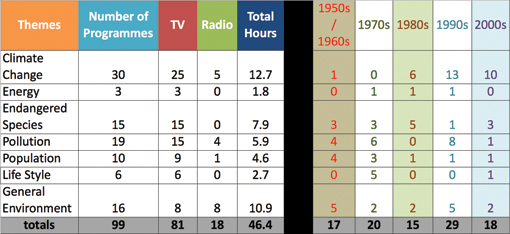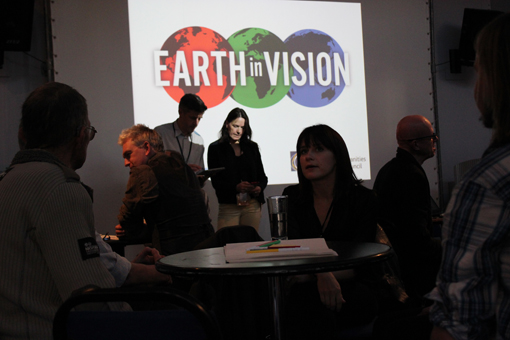Earth in Vision is an AHRC funded project based in the Open University Geography Department, and runs from October 2013-September 2016. Joe Smith, Kim Hammond and George Revill from The Open University provide a glimpse of the big picture.
About the authors:
 Dr George Revill is Senior Lecturer in Geography at The Open University. His publications include: Revill, G. (2012) Railway (Reaktion); Gold, J.R. and Revill, G. (2004) Representing the Environment (Routledge); Pepper, D.M., Revill, G. and Webster, F. (eds) (2002) Environmentalism: Critical Concepts (volumes I – V) (Routledge); Gold, J.R. and Revill, G. eds. (2000) Landscapes of Defence (Prentice Hall.); Revill, G. and Wrigley, R. eds. (1999) Pathologies of Travel (Rudopi Press/Welcome Institute); Leyshon, A., Matless, D. and Revill, G. eds. (1998) The Place of Music (Guilford/Routledge)
Dr George Revill is Senior Lecturer in Geography at The Open University. His publications include: Revill, G. (2012) Railway (Reaktion); Gold, J.R. and Revill, G. (2004) Representing the Environment (Routledge); Pepper, D.M., Revill, G. and Webster, F. (eds) (2002) Environmentalism: Critical Concepts (volumes I – V) (Routledge); Gold, J.R. and Revill, G. eds. (2000) Landscapes of Defence (Prentice Hall.); Revill, G. and Wrigley, R. eds. (1999) Pathologies of Travel (Rudopi Press/Welcome Institute); Leyshon, A., Matless, D. and Revill, G. eds. (1998) The Place of Music (Guilford/Routledge)
 Dr Joe Smith is Senior Lecturer in Environment at The Open University. Recent publications include: Tyszczuk R., Smith J., and Clark N., and Butcher M., (2012) ATLAS of Interdependence: Architecture, Geography and Change in an Interdependent World (Black Dog Publications); Butler, Robert, Eleanor Margolies, Joe Smith, Renata Tyszczuk, (2011) Culture and Climate Change: Recordings (Shed) ; Simms A., and Smith, J. (eds) (2009) Disfruta la Vida sin Cargarte el Planeta (los libros del lince); Peake, S. and Smith, J. (2009) Climate Change: From science to sustainability (Oxford University Press); Smith, J., Brandon M. and Kurtz, M. (2009) Arctic Approach: Journeys Through A Changing World part 2 (The Open University); Blackmore R., King M., Roy R. and Smith, J. (2009) Setting Out From Home: Journeys Through A Changing World part 1 (The Open University); Simms A. and Smith J. (eds.) (2008) Do Good Lives Have to Cost the Earth? (Constable and Robinson); Smith J. (2008) Vihreät (Otava); Smith J. (2007) In cosa credono gli Ecologisti? (Avallardi); Smith J. (2006) What Do Greens Believe (Granta); Smith J. (ed.) (2000) The Daily Globe: Environmental Change, the Public and the Media (Earthscan).
Dr Joe Smith is Senior Lecturer in Environment at The Open University. Recent publications include: Tyszczuk R., Smith J., and Clark N., and Butcher M., (2012) ATLAS of Interdependence: Architecture, Geography and Change in an Interdependent World (Black Dog Publications); Butler, Robert, Eleanor Margolies, Joe Smith, Renata Tyszczuk, (2011) Culture and Climate Change: Recordings (Shed) ; Simms A., and Smith, J. (eds) (2009) Disfruta la Vida sin Cargarte el Planeta (los libros del lince); Peake, S. and Smith, J. (2009) Climate Change: From science to sustainability (Oxford University Press); Smith, J., Brandon M. and Kurtz, M. (2009) Arctic Approach: Journeys Through A Changing World part 2 (The Open University); Blackmore R., King M., Roy R. and Smith, J. (2009) Setting Out From Home: Journeys Through A Changing World part 1 (The Open University); Simms A. and Smith J. (eds.) (2008) Do Good Lives Have to Cost the Earth? (Constable and Robinson); Smith J. (2008) Vihreät (Otava); Smith J. (2007) In cosa credono gli Ecologisti? (Avallardi); Smith J. (2006) What Do Greens Believe (Granta); Smith J. (ed.) (2000) The Daily Globe: Environmental Change, the Public and the Media (Earthscan).
Dr Kim Hammond is Research Associate at The Open University. E-mail: kim.hammond@open.ac.uk Tel: 01908 274066
Path finding in the BBC Archives of Environmental Programmes If you can tell a good story, you can change the world. The release of digital broadcast archives (DBAs) opens up the potential for new forms of story telling, and an expanded body of storytellers. But there are many unresolved questions about who gets access to and permission to use such archives. The new opportunities will see the creation of tools that permit richer use of media online and that facilitate the reusing and re-versioning of DBAs. This might result in new amateur histories and inspiring opportunities for learning and teaching. Just as the combination of digital and phone cameras and social media have allowed billions to share their work as photographers, so too open access to DBAs, associated tools and online broadcasting sites mean that we can all be broadcasters now.
Global Environmental Change and Broadcast Archives These releases and tool developments will have consequences for any field of contemporary history, but are of particular significance for the environmental field. Earth in Vision is a path-finding project exploring the potential and significance of DBAs and associated tools through the case study of environment related broadcasts drawn from over five decades of BBC archives. Framings of environmental change issues have typically been narrow and static, and have reinforced a policy field around these issues that is often unable to address the complexity and uncertainty inherent in these long-term issues. Archive and web developments could combine to allow for more imaginative future cultural responses to issues of environmental change. However without self-critical and open consideration of the 'digital ideologies' embedded in the tools and practices that mediating institutions develop for users' work with these enormous bodies of cultural content, there is a danger that the narrow and frequently unproductive repertoire of environmental framings that is currently dominant will become further reinforced. This project responds directly to this urgent challenge.
Background: Exploring the BBC Broadcast Archives Year, and a key date in the emergence of a global environmental imagination. It is informed by a pilot study, which selected, annotated and cleared limited use rights for around 100 programmes; 50 hours of programming organised across 7 themes (see Table 1) in which we wanted a mix of: film and radio; dates (1960-2009); age of viewer (some children’s programmes); issues; popular TV/radio (i.e. not all Radio 4/ BBC 2) and style of programme (e.g. documentary/news/drama/reality TV).

Table 1: Earth in Vision Selection of BBC Broadcast Archive of Environment Programmes By theme, media and decade
Earth in Vision critically examines the potential of this sample of programmes as a resource for the making and debating of environmental histories in the context of imagining and planning for environmental futures. The work builds on principles of co-production and social learning, and aims to support more plural and dynamic accounts of environmental change.
Aims The project has two central aims which can be summarised as a) to write new environmental histories and stories and b) to explore the practices and expectations of potential DBA users or ‘digital citizens’.
To address these aims we set out to explore:
- the achievements and limitations of existing accounts of environmental discourses and mediations over the last fifty years
- the technical, institutional and cultural considerations that emerge as institutions prepare for substantial digital broadcast archive releases
- the practices and expectations of users of digital broadcast archives
- the ideas and responses of people engaged with environment and development issues (including learners, teachers, engaged publics)

Earth in Vision Workshop (iDocs Bristol, March 2014
What have we achieved and learnt so far? Contextualising DBAs Our research trips to the BBC paper archives in Caversham have been a fruitful start to understanding how scripts and production notes can be used to add contextual history and thus depth to our broadcast archive sample. Such materials can add a compelling layer to the broadcast content, but are subject to copyright and thus clearance for public use is needed and this is a consideration for developers of DBAs. In addition, we plan to interview programme makers/presenters and source other related context, for example to explore production and broadcasting decision making – why a particular angle or theme was taken/promoted or not; why this shot and not that. Such contextualising of DBAs can serve to enhance engagement. In writing new histories of global environmental change with the media ‘written in’, our accounts will illustrate how context and deeper knowledge of the production of past and present environmental understandings support more plural and dynamic environmental accounts and imaginings of environmental futures.
Workshops: What will we do when we get there? From the start, the project team has been developing tailored workshops to think through who will use DBAs, how they will want to use them and what tools they will need, and how will DBAs will impact upon the way those users engage with and act on environmental change issues.
Our Advisory Board partners include broadcasters, filmmakers, archive and environmental education organisations, and we expect future users to include teachers and learners, film making and media people, IT professionals, academics, museum curators, and NGOs and activists. Samples of all of these stakeholders are participating in the project. The workshops offer a space for participants to think through anticipated digital futures and how these are relevant to them personally or professionally; to play with some of the rights cleared archive content; and to explore and reflect upon their own experiences in terms of how broadcasts have influenced their engagement with or understanding of environmental issues.

1. Team Photograph: from left to right: Zdenek Zdrahal, Kim Hammond, Joe Smith and George Revill
We have held workshops with: our Advisory Board; film makers and television and media people at the iDocs festival in Bristol; Press Fellows at Wolfson College, Cambridge; school pupils in Milton Keynes; colleagues at The Open University’s Knowledge Management Institute, and with Open University students who, as the UK's most demographically diverse student population, act as 'proxy publics' of potential future digital citizens. We have workshops planned for the Belfast social sciences festival later this year, for other student and academic groups, and we are interviewing individuals who are using, developing or otherwise working with DBAs in specific contexts.
Among these groups it is clear that there is a strong appetite to work with DBAs, and we are building a complex picture around how people want to work with these materials, and their user’s needs and tools. Some participants have worked with story-telling exercises that draw on samples from the BBC DBA; these have been popular and illustrate the power and creative opportunities of re-using the broadcast materials. Feedback suggests participants find the workshops interesting and stimulating, and leave re-thinking how they use/could use DBAs.
Technical and cultural challenges and opportunities The rights regime around broadcast archives stands out as a central concern for those institutions that will be expected to have responsibility for, or will work with, DBAs (schools; universities; museums; media organisations). Whilst institutions such as the BBC owns its own archive, many of the programmes have significant underlying third party rights (e.g. scriptwriters, actors, music etc.) which require clearance for public/specific use and can be costly. For affordable full open public access to such DBAs, some speculate on the need for a change in legislation. Alternatively, crowd sourced funding via small download payments may be a way forward. In an increasingly digital age, this can be seen as both a challenge and an opportunity for public service broadcasters such as the BBC.
The creative opportunities afforded by DBAs are immense, and we are only just beginning to understand some of the potential benefits and hazards ahead. A clear challenge for those institutions developing DBAs is the technical development of dynamic, contextualised and user-responsive online interfaces. Drawing on our partners and relevant networks, we are developing an industry oriented report which will identify what the elements of a gold standard for DBAs might be. This will be pursued according to principles of co-production, where participants will be invited to feedback on drafts of the e-book and also participate in the final conference in 2016.
Get Involved! In the spirit of co-production, we welcome your views on how you would like to use DBAs, and what tools you would need for those uses. We also welcome invitations to run a workshop at your institution, or to collaborate in other relevant ways
Team: Principal investigator: Joe Smith; Co-investigators: George Revill and Zdenek Zdrahal; Research Associate and Project Manager: Kim Hammond. The team is based in the Dept. of Geography/Open Space Research Centre, The Open University, with the exception of Zdrahal who is Senior Research Associate in the OU’s Knowledge Media Institute.
Contact: project manager kim.hammond@open.ac.uk / 01908 274066